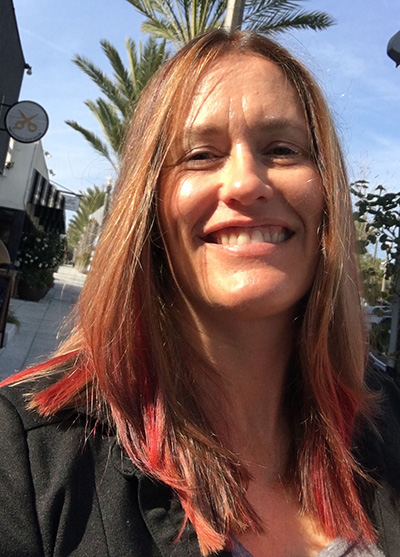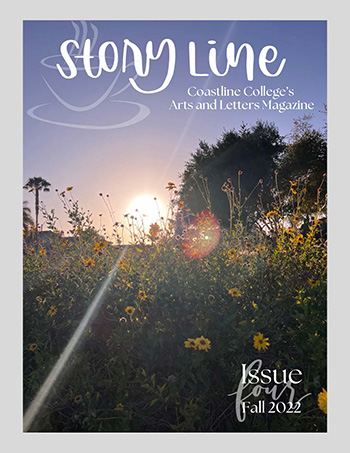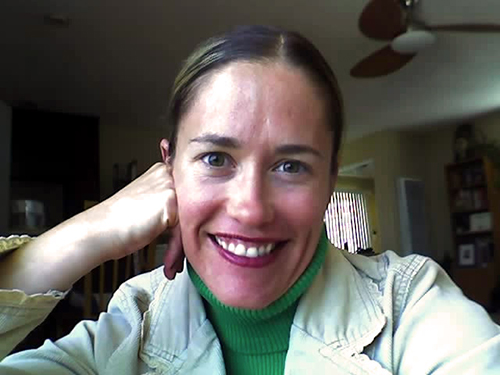For this week’s Teacher Feature, we are back with the Coastline English Department’s very own, and founding editor of Coastline’s Storyline magazine, Professor Oceana Callum!

Since the last time we spoke with Professor Callum, she has had two poems published - Secret Act in the online poetry magazine, A Moon of One’s Own, and Historic House, in the most recent issue of The Cider Press Review: A Journal of Contemporary Poetry. We caught back up with Professor Callum to talk about her writing process, how to get published, the creation of Storyline, and more!
When you’re working on a poem, what is your writing process like?
I’ve been writing them my whole life and I feel like the process is never straightforward. So, I feel like the idea could be simmering for days, weeks, months, or years, and then it just decides it wants to come out one day. But, how it comes out is rarely the form that it's supposed to end up in, so I think that’s the most frustrating and challenging part. Then you get it down on paper and you have to figure out - what is the heart of this poem? What is extra? Because most poems start with much more material than what ends up in the final product. Then, what does this poem really want to be? - and cut out everything unnecessary.
How did Storyline come to be?
I was hired as a full-time instructor in 2017 and one of the questions that I asked in the interview was whether Coastline had a literary magazine because it was something I was involved in at OCC, where I taught before, and also at Saddleback College and Cal State Long Beach, so I feel like most colleges and universities have one. It's just such a great supplement to student life - it’s this creative force - so when I heard that Coastline didn’t have one I thought, if I get this job that would be something that maybe they could use. It just began from there. I had to teach myself graphic design because I’m not a graphic designer, and the first version of the magazine was a Word document. It was so boring looking. The words inside were great and there were some photographs but the layout and stuff, I had to teach it all to myself - so I’m a big fan of Canva, which is like graphic design for dummies.
Explore English Degrees @ Coastline
What is your favorite part about working on Storyline?
Over the last two years, we’ve been inviting students to apply for the guest editor position which, if students are reading this and want to apply, the applications are open now. Working closely with students to edit the magazine has made it so much more fun and has changed the shape of the magazine as well. When I was doing it by myself it was my vision, but it’s so much more fun to see what students come up with. Like this last issue, we had a graphic design student design the cover, so it looked totally different than the previous issues and that was a lot of fun.

As an English Professor, what is your favorite class to teach?
Probably American Literature, I teach it once a year in the spring. I love all my students, but this particular class, because we’re delving into literature and not just talking about writing, it’s just got this added richness to it. We read poems, plays, short stories, and we also learn about the period in American history when those pieces of literature were produced, so it’s really a lot of fun.
Do you have a favorite type of essay you like reading from students?
I really enjoy autobiographical writing. I don’t assign a whole bunch of it because it’s not always applicable to what students want to do later, but at least once each semester, I have students try to write something about themselves. I always find those to be really interesting and eye-opening, and really inspiring too. Community college students, I would say, are among the hardest-working people that I know. So many people are juggling a full-time job, children, caring for parents, being a breadwinner, and then going to school full-time—it’s just amazing.
Check Out Storyline, Coastline's Arts & Letters Magazine
What advice would you give to students who want to publish their work?
First, start with the publications that are closest to you. College and university publications are a great place to start because they want to publish student work and they are a lot more forgiving about you not being professionalized yet. There may be some flaws, and that’s okay. And then there’s a magazine called Poets and Writers, which has a lot of contests, literary magazines, and things like that, which is also great. Getting involved with any sort of writing community can also really help you connect with other writers. You can share ideas, and a lot of times they’ll share publication tips that can be helpful to you.
What advice do you have for someone afraid of the vulnerability that comes with sharing their work?
I think you can always create distance if you want to. One of the best tips I ever got for writing poetry is, if you’re writing a poem and it needs something, or it doesn’t feel finished, or just want to try it a different way, try changing the point of view. So, if the poem is ‘I,’ change it to the second person, ‘you,’ or vice versa, and see what happens. That’s one way a distance can enter the poem, where it's maybe not so clearly about you anymore.
Or, if you’re doing fiction, there are pseudonyms, you can fictionalize people from real life so they're not quite so recognizable. You’ll see a lot of famous writers do things like that. Ernest Hemingway famously wrote what was basically in his mind a true book, and then he published it as fiction so that nobody could sue him.

What is one book you would recommend every English student reads?
I love memoirs, so one of my favorite recent memoirs is called ‘Heavy’ by Kiese Laymon. It’s about so many things, it’s about him growing up poor, African American, and overweight. It’s about those three themes throughout his life, and how he made it to become a published fiction writer, poet, and professor.
What is the best piece of writing advice you would give to a student?
You have to figure out what your writing process is and it’s different for everybody, so what works for somebody else might not work for you. One of the best ways to find that out is to make sure that you leave yourself plenty of time to complete a piece of writing whether you have a deadline or a self-imposed deadline.
Writing really wants to go through multiple drafts, and one thing I found is when I write something and I’m really excited about it, I can’t probably see it clearly yet. So, if I just sent that thing out right when I was done with it, people would point out flaws, or it wouldn’t be accepted in the way that if I come back to it after some distance, and look at it again, I’m going to see it differently. I’m going to see flaws and areas of improvement, so I would just say give yourself the time to sit with your writing over an extended period of time to give yourself the perspective that you need.
Thank you so much to Professor Callum for chatting with us again and very big congratulations on her recent poem publications!